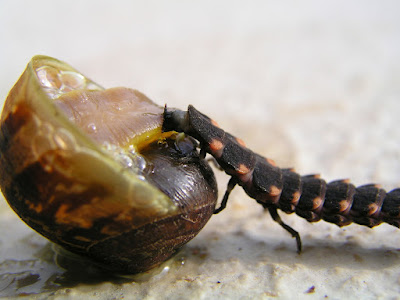You must be aware of several predators, parasites and diseases if you
really want to make it in this business Because Snails have many natural
predators, including members of all major vertebrate groups, carnivorous
snails, ground beetles, leeches and even predatory caterpillars.
Predators
When we talk about predators the major predators of snail farming are
field mice, rats and shrews, frogs and toads, thrushes, crows and domesticated
birds such as ducks and turkeys, lizards and snakes, drilid and carabid
beetles, and millipedes and centipedes. The frogs tend to take only the young
snails, while the reptiles eat both eggs and snails of all ages.
If your farm is located in an area with high bird predation, it is
necessary to use nets to cover your pens. You should make sure you are removing
leftover food daily from pens because some predators, particularly rats and
field mice, are attracted by the leftover foods. These predators can decimate a
farm in a few days.
Diseases
The disease that are known which attack snails are fungal disease it
spread through physical contact by the snails licking slime from each other's
bodies. The first is a bacterial disease, caused by Pseudomonas; it leads to intestinal
infections that may spread rapidly amongst dense snail populations. The
second disease is caused by the fungus Fusarium, which parasitises their eggs of Helix aspersa. The affected eggs turn
reddish-brown and development stops. This disease is commonly referred to as
'rosy eggs disease'.
Parasites, nematodes, trematodes, fungi,
and microarthropods can attack snails, and such problems can spread
rapidly when snail populations are dense. The bacterium Pseudomonas eruginosa causes
intestinal infections that can spread rapidly in a crowded snail pen so make sure
that your pen is not over crowded..
Possible predators
include rats, mice, moles, skunks, weasels, birds, frogs and toads, lizards,
walking insects (e.g., some beetle and cricket varieties),
some types of flies, centipedes, and even certain carnivorous snail
species, such as Strangesta
capillacea can also feed on your snail if your pen is not well
secured.
Basic hygiene prevents the spread of diseases. What you can do to
prevent your snail farm from dis disease is to make sure you are cleaning it
regularly to remove excreta and uneaten food, as well as any other decaying
matter that may serve as substrate for pathogenic organisms. It is also
advisable to sterilise the soil in hutch boxes by steaming or heating every
time they are being prepared for a new batch of egg.


